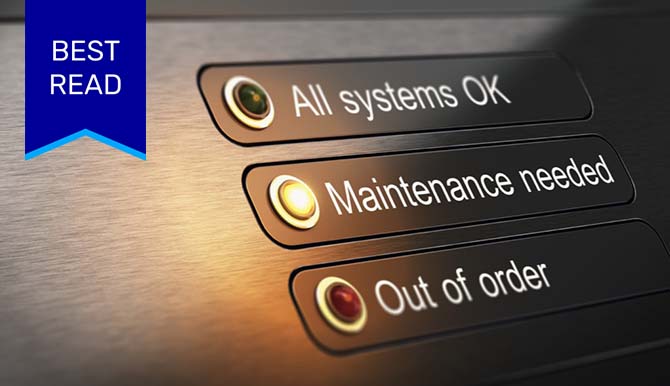
Machine Health solutions can make factories more smart, efficient and predictable. As a result, it can also make the business behind the factory more flexible and agile. We call that a double-win.
This article was originally published on Nov 18, 2020.
When you combine data from numerous machine health use cases, you get the key insights you need to create a smart factory. But when you combine machine health data from all of your factories, you get the beginnings of a smart business. You won’t just know when a machine might break down or when you need a part replaced. You’ll know how to optimize each factory’s output and how to adapt production cycles to meet new market demands.
Much like a single brick doesn’t make an entire building, machine health monitoring in one or two factories doesn’t create a smart business. It does, however, represent the first step in building a more networked, ecosystem-based approach to manufacturing. The industry’s future will rest on companies’ ability to transform predictive and prescriptive maintenance technologies into smart businesses and smarter, more agile supply chains.
Leveraging Machine Health Monitoring at Scale
Manufacturing is moving toward more customization and better, more personalized products. Machine health monitoring is the first step into this new ecosystem, where manufacturers can work with partners, vendors, and consumers to create products that reflect shifting demands. For this to be a meaningful step, however, it must be at scale. Companies need insight into their entire operations before they can align production with what their customers need.
Consider the difference between mass marketing and fully personalized marketing, which mirrors the transition from industry 3.0 to industry 4.0. Data becomes infinitely more useful the more granular it becomes. Machine health monitoring gives companies a real-time sense of how their machines are operating. Yet a machine health platform aggregates granular data from every machine in every facility to predict how those machines will operate together in the future.
As your entire business becomes smarter, machine health data gives you a clearer picture of the business’s ecosystem and its place in the overall supply chain’s ecosystem. For example, as a smart business, you have several capabilities that positively influence both your own productivity as well as the supply chain at large:
• More accurate predictability
When we talk about the predictability of performance, machines, processes, or people, the big questions are: How are they operating now? How will they operate under different conditions? Can we change, optimize, or fine-tune any specific condition to improve their performance based on that insight?
A machine health platform provides vital predictive analytics in manufacturing to answer these questions clearly and accurately. With these answers, you can take surprises out of the equation — not just for your business, but for the entire supply chain.
In the same way insights enable smart factories, smart businesses can empower the rest of the supply chain to be more predictive. Insight into performance and predictability can help you avoid operational setbacks that ripple across the ecosystem, as well as uncover hidden machine uses to boost efficiency.
• Greater agility and flexibility
Predictability answers the questions of how your machines are doing and how they will do if you tweak certain conditions. Agility and flexibility relate to how well your business can discover, learn about, and deliver on whatever is coming next. It’s not just keeping up with the times, but understanding what new conditions are coming, how your business will respond, and what conditions to tweak in each factory to meet the new demands.
For example, say you’re a company that produces sugary beverages, but society starts moving away from these types of products. Though your production line has been optimized to serve sugary beverages, a machine health platform can help you discover how those same machines will function in the absence of sugar. Maybe resistance in the mixing vats will be lower, so you won’t have to run the machines as hard.
Having this kind of visibility into how machines work, now and under various conditions, allows you to pivot with confidence to meet the demands of the future. You won’t be tied to processes created for outdated products, and your supply chain can adapt more quickly and efficiently to customers’ needs.
Want to talk more about making your business smarter? Reach out!






